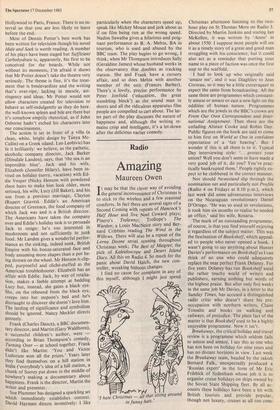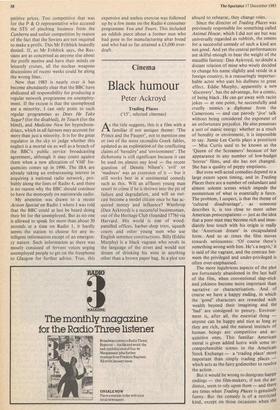Radio
Amazing
Maureen Owen
It may be that the clever way of avoiding heneral general inconvenience of Christmas is the
to stick to the wireless and a few seasonal comforts. In fact there are several signs of a Second Coming with repeats of Hancock's Half Hour and five Noel Coward plays; Pinero's Trelawny; Trollope's The Warden; a Louis MacNeice story and Ber- nard Cribbins reading The Wind in the Willows. There will also be a repeat of the Lorna Doone serial running throughout Christmas week; The Best of Maigret; the pick of Kaleidoscope and Desert Island Discs. All this on Radio 4. So much for the panic about David Hatch, the new con- troller, wreaking hideous changes.
1 find no cause for complaint in any of this myself, although I might just spend 'I hate Christmas — all that sitting around in funny hats.' Christmas afternoon listening to the two- hour play on St Thomas More on Radio 3. Directed by Martin Jenkins and staring Ian McKellen, it was written by 'Anon' in about 1550. I suppose most people will see it as a timely story of a great and good man struggling with his conscience, but it could also act as a reminder that putting your name to a piece of faction was once the first step to the scaffold.
I had to look up who originally said 'amaze me', and it was Diaghliev to Jean Cocteau, so it may be a little extravagant to expect the same from broadcasting. All the same there are programmes which constant- ly amuse or amaze or cast a new light on the oddities of human nature. Programmes which are the jewels in the BBC's crown are From Our Own Correspondent and Inter- national Assignment. Then there are the unfading Alistair Cooke and Robin Day. Public figures on the hook are said to come to him first on World at One in confident expectation of a 'fair hearing'. But I wonder if this is all there is to it. Typical
Day interviewing style: protect your union? Well you don't seem to have made a very good job of it, do you? You've prac- tically bankrupted them.' People rightly ex- pect to be clobbered in the correct manner.
Nor should Newsstand slip through the nomination net and particularly not Profile (Radio 4 on Fridays at 8.10 p.m.), which last week did some adventurous interviews on the Nicaraguan revolutionary Daniel D'Ortego. 'He was so used to revolutions, it took him six months to realise he needed an office,' said his wife, Rosaria.
The mark of an outstanding programme, of course, is that you find yourself enjoying it regardless of the subject matter. This was the fascination of Bookshelf, which appeal- ed to people who never opened a book. I wasn't going to say anything about Hunter Davies's performance on Bookshelf as I can think of no one who could adequately replace the near perfect Frank Delaney. For five years Delaney has run Bookshelf amid the rather touchy world of writers and publishers, earning nothing but words of
the highest praise. But after only five weeks in the same job Mr Davies, in a letter to the
Sunday Times, has accused a distinguished
radio critic who doesn't share his pre- occupation with northern writers, Claire Tomalin and books on walking and railways, of prejudice. The plain fact of the
matter is that Bookshelf used to be a highly enjoyable programme. Now it isn't.
Breakaway, the critical holiday and travel review is a programme which seldom fails
to amuse and amaze. I say this as one who has not been on holiday for nine years and has no distant horizons in view. Last week
the Breakaway team, headed by the rakish
Bernard Falk, unexpectedly produced a 'Russian expert' in the form of Mr Eric Fribbick of Sydenham whose job it is to organise cruise holidays on ships owned by the Soviet State Shipping fleet. By all ac- counts these holidays have been a hit with British tourists and provide popular, though not luxury, cruises at all too com-
petitive prices. Too competitive that was for the P & 0 representative who accused the STS of pinching business from the Canberra and unfair competition by reason of the fact that the Soviets are not required to make a profit. This Mr Fribbick heatedly denied. If, as Mr Fribbick says, the Rus- sians are as concerned as anyone else about the profit motive and have their minds on leisurely cruises, all the nuclear weapons discussions of recent weeks could be along the wrong lines.
Now that 1983 is nearly over it has become abundantly clear that the BBC have abdicated all responsibility for producing a regular network programme on unemploy- ment. If the excuse is that the unemployed are a minority, I can only point to such regular programmes as Does He Take Sugar? (for the disabled), In Touch (for the blind), and Medicine Now for hypochron- driacs, which in all fairness may account for more than just a minority. It is for the great regulator in the sky to judge whether this neglect is a mortal sin as well as a breach of the BBC's public service broadcasting agreement, although it may count against them when a new allocation of VHF fre- quencies comes up in 1990. The IBA are already taking an embarrassing interest in acquiring a national radio network, pro- bably along the lines of Radio 4, and there is no reason why the BBC should continue to have the monopoly on nationwide radio.
My attention was drawn to a recent Action Special on Radio 1 where I was told that the BBC could at last be heard doing their bit for the unemployed. But as no one is allowed to speak for more than about 30 seconds at a time on Radio 1, it hardly seems the station to choose for any in- telligent information except of an emergen- cy nature. Such information as there was mostly consisted of fervent voices urging unemployed people to get on the freephone to Glasgow for further advice. True, this expensive and useless exercise was followed up by a few items on the Radio 4 consumer programme You and Yours. This included an oddish piece about a former nun who had gone in for manufacturing altar bread and who had so far attained a £3,000 over- draft.







































































 Previous page
Previous page